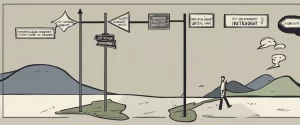—A Way of Being & The Art of Loving
In the realm of self-development and personal growth, two influential works have captivated readers for decades, enticing them to explore the depths of human existence and relationships. Carl R. Rogers’ “A Way of Being” and Erich Fromm’s “The Art of Loving” offer profound insights into the human condition, prompting us to ponder the essence of love, authenticity, and personal fulfillment. Although approaching these themes from different angles, both books delve into the complexities of human experience and provide a guide towards a more meaningful and connected existence. As we embark on this comparative study, we will explore the distinct perspectives of Rogers and Fromm, examining their differing approaches to love and selfhood, while searching for common threads that may intertwine their philosophies and offer readers a richer understanding of the human psyche. By juxtaposing these two literary masterpieces, we hope to shed light on the fundamental questions of what it means to be human, how we can foster genuine connections with others, and ultimately, how we can lead a more fulfilling life.
Brief Summary of Two Books
A Way of Being by Carl R. Rogers
A Way of Being” by Carl R. Rogers is a thought-provoking book that explores the author’s philosophy and approach to therapy, personal growth, and human relationships. Rogers emphasizes the importance of authenticity, empathy, and acceptance in enhancing personal growth and fostering positive change. He shares his own experiences and cases from his practice to showcase the power of being genuine and understanding towards oneself and others. The book encourages readers to approach life with an open mind, promote personal freedom and growth, and strive for harmonious relationships built on trust and empathy.
The Art of Loving by Erich Fromm
The Art of Loving” by Erich Fromm is a philosophical and psychological exploration of love and the various dimensions it encompasses. Fromm argues that love is an art that requires knowledge, effort, and practice to be truly fulfilling. He critiques the popular misconception of love as simply a feeling and instead argues for love as an active and conscious choice. The book delves into various aspects of love, including self-love, the need for connection, the role of reason and will, and the challenges of modern society in cultivating genuine love. Fromm emphasizes the importance of overcoming societal influences and developing the capacity to love authentically. Overall, the book offers profound insights into the complexities of love, providing readers with a guide to fostering deeper and more meaningful relationships in all areas of life.
Comparison between Two Books

Similarities in personal growth
Both “A Way of Being” by Carl R. Rogers and “The Art of Loving” by Erich Fromm explore the theme of personal growth, albeit from different perspectives. Here are some similarities between these books in terms of personal growth:
1. Self-acceptance: Both authors emphasize the importance of self-acceptance as a foundation for personal growth. Rogers stresses the importance of listening to one’s own inner experiences and embracing them without judgment. Fromm argues that individuals must first love and accept themselves before they can truly love others.
2. Authenticity: Both Rogers and Fromm advocate for living authentically. Rogers emphasizes the need for genuineness and congruence in one’s interactions with others, while Fromm argues that individuals can only grow if they are true to their own nature and not driven by external expectations.
3. Emotional well-being: Both authors highlight the significance of emotional well-being for personal growth. Rogers emphasizes the importance of accessing and processing our emotions to achieve optimum growth. Fromm suggests that emotional health is essential for individuals to love genuinely and develop meaningful connections with others.
4. The role of relationships: Both books recognize the role of relationships in personal growth. Rogers emphasizes that positive and respectful relationships are crucial for individuals to grow and develop their full potential. Fromm, on the other hand, suggests that love – in the form of genuine, respectful, and compassionate relationships – is a key driver of personal growth.
5. Autonomy and individuality: Both Rogers and Fromm emphasize the importance of autonomy and individuality in personal growth. Rogers argues that individuals must trust their own experiences and have the freedom to make decisions that align with their values. Fromm discusses the importance of individuality, highlighting that personal growth involves self-discovery and the ability to live according to one’s own values rather than conforming to societal expectations.
In summary, “A Way of Being” by Carl R. Rogers and “The Art of Loving” by Erich Fromm both stress the significance of self-acceptance, authenticity, emotional well-being, the role of relationships, and autonomy for personal growth. While Rogers focuses more on therapeutic relationships and the individual’s relationship with oneself, Fromm delves into the dynamics of loving relationships and their impact on personal growth.
Divergences in personal growth
A Way of Being by Carl R. Rogers and The Art of Loving by Erich Fromm are both influential books in the field of personal growth and self-improvement. While they share some common themes, they also diverge in their perspectives on personal growth.
One notable divergence between the two books is their approach to personal growth. Rogers emphasizes the importance of self-acceptance and self-esteem as the foundation for personal growth. He argues that individuals need to develop a sense of self-worth and self-acceptance in order to fully actualize their potential. Rogers believes that personal growth stems from an individual’s ability to be genuine, accepting, and empathetic towards oneself and others.
In contrast, Fromm’s The Art of Loving focuses on the idea that personal growth arises from the capacity to love. Fromm argues that love is an art that requires discipline, knowledge, effort, and practice. He believes that love is not just a feeling, but a skill that needs to be cultivated. Fromm suggests that personal growth comes from the ability to love oneself and others deeply and authentically.
Another divergence between the two books is their perspective on the role of society in personal growth. Rogers emphasizes the importance of an individualistic approach, highlighting the idea that personal growth is primarily an internal process. He suggests that individuals need to focus on their own values, beliefs, and experiences to achieve personal growth.
On the other hand, Fromm takes a socio-cultural perspective, emphasizing the impact of society on personal growth. He argues that societal norms, values, and structures significantly influence individuals’ capacity to love and grow. Fromm highlights the need for individuals to critically examine societal influences and work towards breaking free from societal constraints to reach personal growth.
In conclusion, while both A Way of Being by Carl R. Rogers and The Art of Loving by Erich Fromm share a common aim of personal growth and self-improvement, they diverge in their approaches. Rogers focuses on self-acceptance and empathy, while Fromm emphasizes love as an art and the impact of society on personal growth. These divergences provide readers with different perspectives and tools for achieving personal growth.

Conclusion
Both “A Way of Being” by Carl R. Rogers and “The Art of Loving” by Erich Fromm are highly influential and notable works in the field of psychology.
“A Way of Being” is a collection of essays by Carl R. Rogers, a famed psychologist and one of the founders of humanistic psychology. In this book, Rogers explores the importance of authenticity, empathy, and self-actualization in one’s personal and professional life. He discusses the concept of unconditional positive regard and the therapeutic relationship, emphasizing the importance of a non-judgmental and accepting attitude towards oneself and others.
“The Art of Loving” by Erich Fromm is a philosophical exploration of love and its various dimensions. Fromm distinguishes between immature, selfish forms of love and genuine, selfless love. He discusses the challenges of modern society and its impact on one’s ability to truly love, providing insights into how individuals can develop and cultivate a more compassionate and fulfilling love.
Both books offer valuable insights into personal growth and relationships, albeit from different perspectives. The choice ultimately depends on the reader’s interests and what they hope to gain from the reading experience. If you are more interested in the practice of therapy and the importance of empathy and acceptance, “A Way of Being” may be more suited for you. On the other hand, if you are interested in a broader exploration of love and its social implications, “The Art of Loving” may be a better choice.



